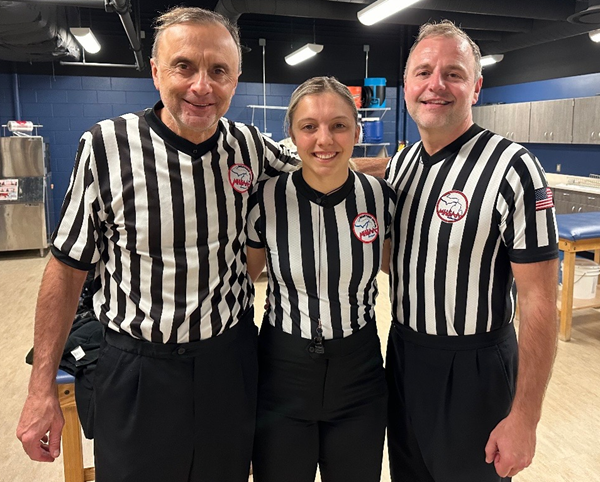
Making (Health) Histories Every Year
July 23, 2015
By Rob Kaminski
MHSAA benchmarks editor
Tom Minter, recently retired from the MHSAA as assistant director, wore many hats while serving the Association and donned official’s gear in numerous sports outside of business hours.
But one of his finest refereeing efforts might have come during the 2009-10 and 2010-11 school years when he guided approximately 60 individuals representing 25 medical and professional organizations through an arduous process to upgrade the antiquated Physical Form to what is the standard today: the Pre-participation Physical Examination/Health History Form.
The form highlighted Stage 1 of the MHSAA’s 4 Hs of Health and Safety – Health Histories – and the current form is much more comprehensive, answering questions previously not asked during the quicker, more brief, evaluations.
Sudden cardiac death claims the lives of more than 300 Michigan children and young adults between the ages of 1-39 years annually. Yet, many of these deaths could be prevented through screening, detection, and treatment. One such way to detect high risk conditions that predispose to SCDY is through pre-participation sports screening of student-athletes, and the current physical form provides a mechanism.
While much more detailed, schools report that parents are more than willing to take the extra time and effort to complete the lengthier version.
“When the expanded form came out, people kiddingly made comments about its length; yet in today's day and age everyone understands we need all the information we can cultivate regarding health histories of our student athletes,” said Mark Mattson, athletic director at Traverse City Central.
Down state, feelings have been similar. “We don’t have a problem at all here,” said Anna Devitt, athletic secretary at Hartland High School. “Our parents take care of it, and haven’t balked at the length at all.”
Both agree, and are joined by many others across the state, that the next logical step is for the form to be converted to a fillable, online document so that records can be accessed by those in need via mobile, laptop or desktop.
Thus, in the “No H left behind” mantra that the MHSAA has assumed, an electronic option of the Health History form is in the early planning stages.
“As an increasing number of our schools strive to be ‘paper-free,’ or at least as much so as possible, it is time to re-invent the delivery method for perhaps our most downloaded or distributed document,” MHSAA Executive Director Jack Roberts said. “Once again, as we move forward with our ‘Heart’ initiative for the coming school year, we are also intent on bringing other projects up to speed.”
The masses are certainly enthused.
“That would be heavenly. An online version that would prevent people from submitting the forms until all the required information was in place would be fantastic,” said Mattson, who has had to turn back, or hold out students while waiting for completed forms, whether at Marquette, Maple City Glen Lake, or his current post in Traverse City. “It’s always been the same; people move too quickly and overlook required fields. It would prevent two things: one, having to hold kids out while waiting for a signature, and two, prevent parents from having to drive in to the athletic office to sign or fill in that last field. We’d know we were getting a completed form.”
At Hartland, where athletic director Jason Reck created an online emergency contact form, a system is in place which allows coaches, administrators and trainers to share necessary data for all student-athletes in addition to the MHSAA forms.
“Our parents love the online emergency contact form, and we require them to fill it out every season, not just once a year,” Devitt said. “Sometimes an athlete gets injured during one season and the next season's coach wants to know about it.”
The information on the form is populated into an Excel spreadsheet which Reck, Devitt, the school trainer and all coaches can access. They can tailor the data by sport and pull it to their mobile devices.
“We’re trying to go completely paperless, and the MHSAA physical form would be another step,” Devitt said. “Our parents and doctor’s offices would love it.”

Longtime Taylor AD, Game Official Ristovski Chose Athletics as Way to Give Back
By
Doug Donnelly
Special for MHSAA.com
February 20, 2024
There is a basketball court 5,000 miles from Sterling Heights with “MHL” painted on the center court.
 It’s not the name of a local basketball league in the village where it is located – Siricino, Macedonia. Instead, it stands for Madison, Haleigh and Lola, the three daughters of longtime Michigan basketball coach, referee and athletic director Loren Ristovski.
It’s not the name of a local basketball league in the village where it is located – Siricino, Macedonia. Instead, it stands for Madison, Haleigh and Lola, the three daughters of longtime Michigan basketball coach, referee and athletic director Loren Ristovski.
“My dad loved going back (to Macedonia),” said Madison Ristovski. “He’s probably gone every summer since about 2017. His whole family still lives there. He loved going and visiting and seeing everyone.
“It was always a goal of his to give back to where he came from. He and Mom donated to the village to build a soccer field and basketball court with lights and everything. It was a pretty big deal. It’s something he wanted to do for them back home. We were very proud he did that.”
Loren Ristovski, athletic director for Taylor schools, died earlier this month while on leave to have surgery on his foot. It was a shock to his family, friends, and the Taylor community.
“It was a heavy blow,” said Matt Joseph, girls basketball coach at Utica Ford and a longtime friend of the Ristovski family. “It was like getting kicked in the gut. Basketball was his passion. Next to his family, basketball was definitely No. 1. He loved the game and all the intricacies of it. He loved seeing kids excel.”
 Ristovski emigrated from Macedonia to Michigan when he was 9. He went to high school at Hamtramck St. Florian, where he excelled at basketball. He went to Wayne State University to get a degree in criminal justice and had plans to become a lawyer.
Ristovski emigrated from Macedonia to Michigan when he was 9. He went to high school at Hamtramck St. Florian, where he excelled at basketball. He went to Wayne State University to get a degree in criminal justice and had plans to become a lawyer.
Before he could take the Law School Admission Test, however, basketball came calling.
“He started coaching at Henry Ford High School and Fuhrmann Middle School,” Madison said. “Once he realized how much he enjoyed coaching, he decided to go into education. He stayed the entire time. He never went to law school.”
Loren Ristovski became the head coach at Harper Woods but gave that up when his daughters were ready to start playing in high school.
“He gave up coaching varsity at Harper Woods so he could be at every one of my games,” Madison said.
He also coached them as youngsters, often teaming with Joseph to coach an AAU team.
“I met him when Madison was 5,” Joseph said. “He and I decided to put our daughters in the same parks and recreation team, and next thing you know we were coaching AAU.”
With Ristovski’s tutoring, Madison, Haleigh, and Lola all excelled at the game, each playing Division I college basketball after standout careers at Grosse Pointe Woods University Liggett. In 2012, Liggett reached the Class C Final with all three starting. They combined for 55 of Liggett’s 57 points in the championship game, with Madison scoring 42 after earlier that week receiving the Miss Basketball Award.
Lola and Haleigh played at the University of Detroit Mercy, and Madison played at the University of Michigan. Today, Haleigh lives on the west side of the state and plays recreational basketball. Lola is a referee in the Catholic High School League as well as for the Division II Great Lakes Intercollegiate Athletic Conference, and also works area Division III college games.
Madison is a teacher and the varsity girls basketball coach at Sterling Heights Stevenson.
“He taught us the game when we were very, very young,” Madison said. “We grew up in the gym with him and watched him coach his team. He coached me my whole life. He was very instrumental – he taught us all those things you need to become an athlete, and more importantly the things you need to do to succeed in life.”
Her dad is the reason she became a coach.
 “Watching my dad coach and seeing the impact he had on his high school athletes and even the kids in our church community – it inspired me to want to coach as well and give back like he did,” she said. “I watched him with my teammates and the impact he had on them. I thought it would be so cool if I could do the same for others.”
“Watching my dad coach and seeing the impact he had on his high school athletes and even the kids in our church community – it inspired me to want to coach as well and give back like he did,” she said. “I watched him with my teammates and the impact he had on them. I thought it would be so cool if I could do the same for others.”
Loren Ristovski left a legacy at Taylor, too. School officials recounted several stories of how he balanced athletic budgets with the needs of student-athletes. He would lead fundraising efforts, created the Bitty Ball program for youth basketball players and cheerleaders and helped students become certified officials – and then would hire them to officiate games.
“He didn’t say no,” said Taylor boys basketball coach Chris Simons. “We made it work. We didn’t go out and ask people for a bunch of money. We would just do it. We all pulled together and made it work. Loren did everything he could to make things as pretty and presentable as he could with the budget we had.”
Ristovski also put on summer camps at both Taylor and at the Joe Dumars Fieldhouse in Sterling Heights, where he lived. He commuted about an hour to Taylor every day.
“He loved Taylor,” Madison said. “He loved who he worked with and the students. He included us, too. My mom would run the ticket table or do the scoreboard clock. I don’t know how many times I sold tickets for volleyball tournaments with him. He loved his people and loved having us there with him.”
Loren Ristovski, who played professional basketball in Europe during the late 1980s, ran well over 20 marathons in his life, including the Boston Marathon. He was a registered MHSAA official for 16 years, and in the weeks before his passing he refereed a varsity game in Rochester with his daughter, Lola.
“He looked at basketball, I think, differently than other people do,” Madison said. “He saw it as a way to have relationships with other people, to help people achieve their goals and to find meaningful relationships with others. It was more than just a game to him.”
 Doug Donnelly has served as a sports and news reporter and city editor over 25 years, writing for the Daily Chief-Union in Upper Sandusky, Ohio from 1992-1995, the Monroe Evening News from 1995-2012 and the Adrian Daily Telegram since 2013. He's also written a book on high school basketball in Monroe County and compiles record books for various schools in southeast Michigan. E-mail him at [email protected] with story ideas for Jackson, Washtenaw, Hillsdale, Lenawee and Monroe counties.
Doug Donnelly has served as a sports and news reporter and city editor over 25 years, writing for the Daily Chief-Union in Upper Sandusky, Ohio from 1992-1995, the Monroe Evening News from 1995-2012 and the Adrian Daily Telegram since 2013. He's also written a book on high school basketball in Monroe County and compiles record books for various schools in southeast Michigan. E-mail him at [email protected] with story ideas for Jackson, Washtenaw, Hillsdale, Lenawee and Monroe counties.
PHOTOS (Top) Loren Ristovski, far left, and wife Svetlana support their lineup of Division I basketball-playing daughters – from left: Madison, Haleigh and Lola. (Middle) Loren Ristovski heads an all-family officiating crew with Lola and his brother Dean Ristovski. (Below) The daughters’ initials “MHL” glow on the court the family funded in Macedonia. (Photos courtesy of Madison Ristovski.)

